
 A Minnesota PBS Initiative
A Minnesota PBS Initiative
Fargo-Moorhead Vietnam War Referendum May 4, 1971
By the early spring of 1971 the American public had become increasingly disenchanted with the Vietnam War, leading to large demonstrations in Washington D.C. and other cites, as well as on college campuses, where many young people of draft age demonstrated, held “teach ins”, burned draft cards and, in some cases, avoided the draft by fleeing into Canada.
When national leaders were asked to justify the war, they sometimes stated that we were fighting to obtain the right of “self determination” for the Vietnamese.
I was teaching at the Moorhead State College Campus High School at that time. It seemed that in all the maelstrom around our military involvement, the notion of “self determination” was not being officially played out in our own country.
Our goal was to win official approval from the city council vote on the War. To our knowledge, no U.S. city had held such a vote. Moorhead would be the first.
So, after asking the Mayor of Moorhead if the city could sponsor a community wide vote about our Vietnam involvement, and having him dismiss the idea out of hand, I took the idea to the campus school faculty and administration to see if they felt it to be an appropriate student civic activity to try to get the Moorhead City Council to approve an official referendum on the war. They agreed.
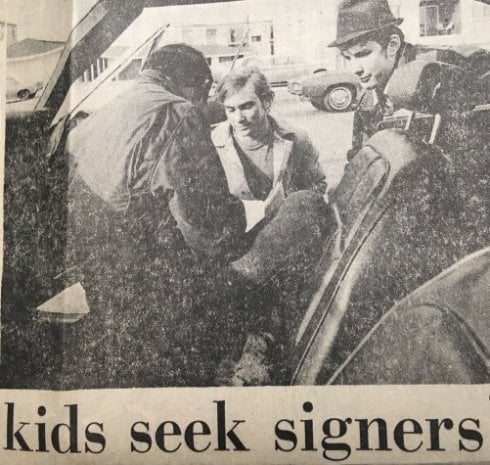
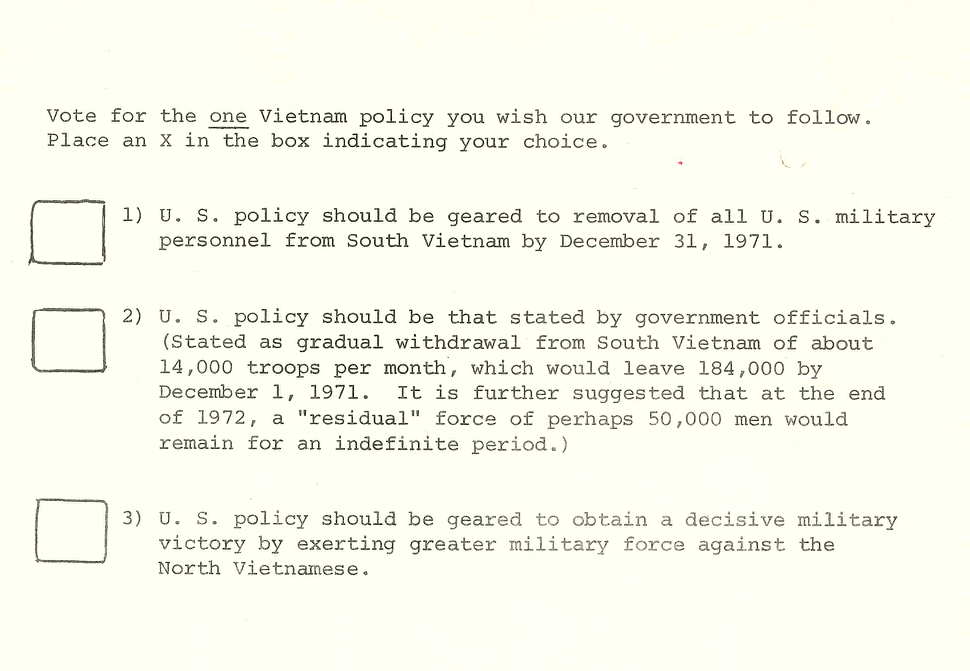
This was not an activity promoted by a bunch of peaceniks. There were many veterans or veterans’ wives on the faculty of the campus school. Indeed, the Director (Principal) of the school was an ex-Marine who, as a teenager, toward the end of WWII, had fought in some of the bloodiest island battles of the Pacific and, after serving his tour, was later called back to serve in the Korean War, where he ended up in the northern part of Korea at the time the Chinese crossed the Yalu river. Another indelible war experience for him. No naivete’ here.
Our goal was to win official approval from the city council vote on the War. To our knowledge, no U.S. city had held such a vote. Moorhead would be the first.
We invited speakers into social studies classes or to speak to the secondary student body. Among these speakers were city council members, U.S. House of Representative Seventh District Congressman Bob Bergland, a news reporter from the Minneapolis Tribune, and others.
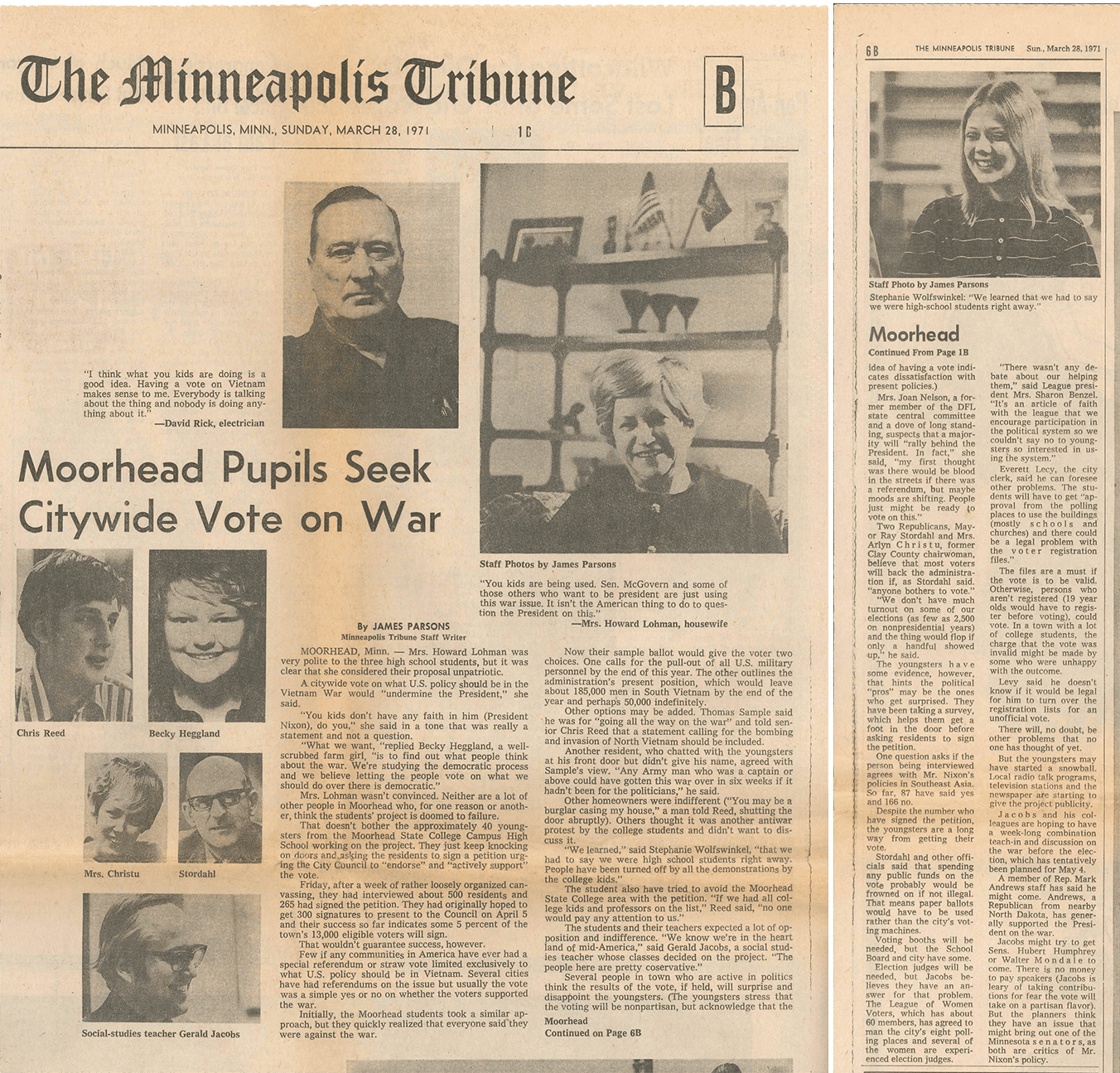
The high school students organized themselves and started going door-to-door to obtain signatures from Moorhead residents on a petition backing a vote. They chose one of their classmates as a spokesperson. The petition, signed by hundreds of Moorhead citizens, was presented to the Council before a crowded chamber where the Associated Press, local press and other media people were present. The Council agreed and authorized the students to carry out the referendum with the city’s blessing. The school board would open the usual polling places.
There was no Republican, Democratic, city or other organization providing money. This was a purely voluntary, high school civics activity, without political affiliation other than being American citizens.
The result of the students’ City Council success caused a ripple effect as the news of a city wide referendum spread locally and regionally. Subsequently, a Catholic priest, Father Sinner, the brother of North Dakota’s future governor, spoke before the Fargo city commission to request that they join Moorhead in support of the community vote. They agreed. Now the entire metro area was on board. A great success due principally to the work of high school students, whose work launched everything.
Between the time the vote was officially approved and the actual date of the vote, local radio provided time on a call in show and Public TV provided time for a discussion program entitled, “Speak for Yourself, John Public”. As the date of the vote came nearer, the Fargo Forum, the Minneapolis Tribune, and other papers published updates, timelines, and interviewed officials. The high school students also published and distributed a news letter encouraging people to vote.
Students had no budget for any of this. There was no Republican, Democratic, city or other organization providing money. This was a purely voluntary, high school civics activity, without political affiliation other than being American citizens. Many individuals and institutions provided critical support, but no money.
The day of the vote came: May 4, 1971. The League of Women Voters had volunteered to man the polling places with the students. At the end of the day over 5,000 people had voted and the results were transmitted locally, regionally and nationally by various media outlets. The national reach of the voting results was demonstrated when the conservative commentator, Paul Harvey, announced the results on his radio show. His radio network reached 1,300 stations nationwide. Of the three choices offered on the ballot, 71% voted to pullout from Vietnam by the end of the year, 22.7% favored a policy geared to a decisive military victory by exerting greater military force against the North Vietnamese. Only 3% favored the stated U.S. policy of “gradual withdrawal, leaving 184,000 troops at year end and a residual force of perhaps 50,000 indefinitely.”
Students also wrote letters to public officials in MN and North Dakota, informing them of the results. Ten days later, North Dakota Senator Quentin Burdick stated the results on the Senate floor and his remarks, along with the letter he had received from the Moorhead State College High School students, were both entered into the Congressional Record of May 14, 1971.
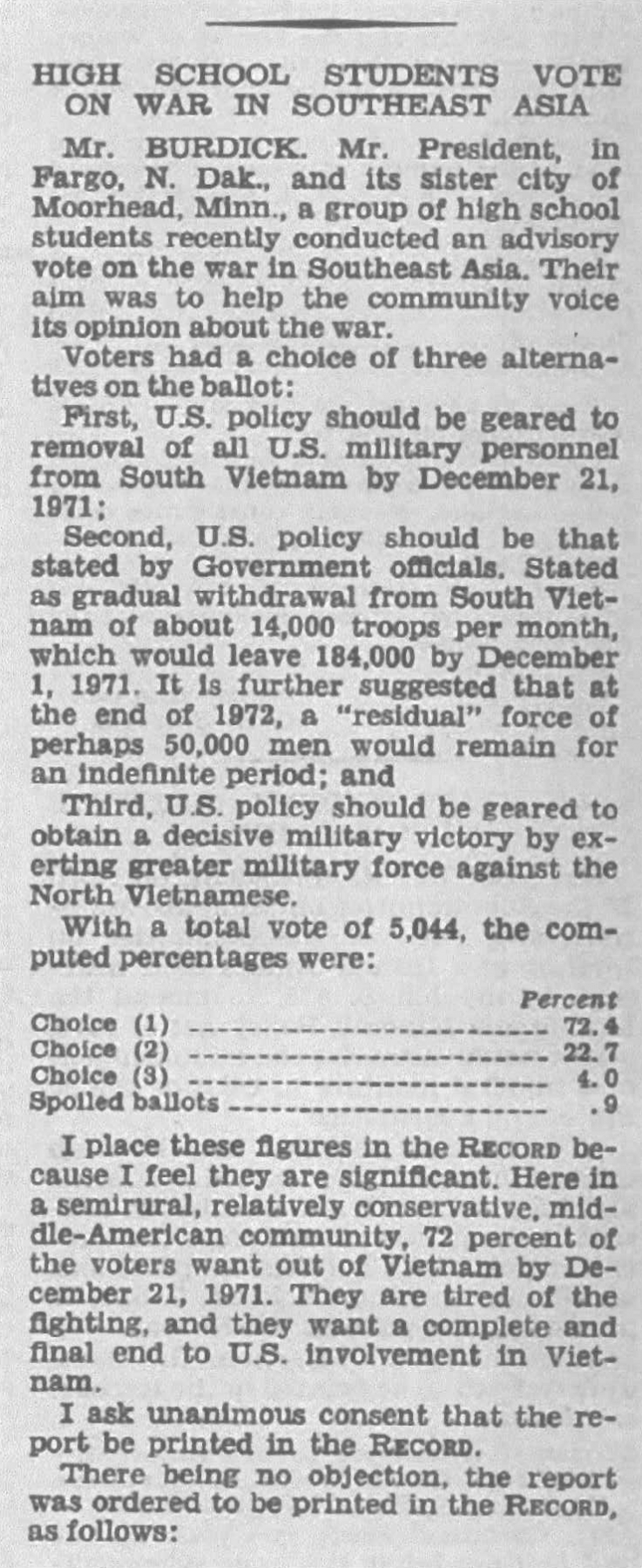
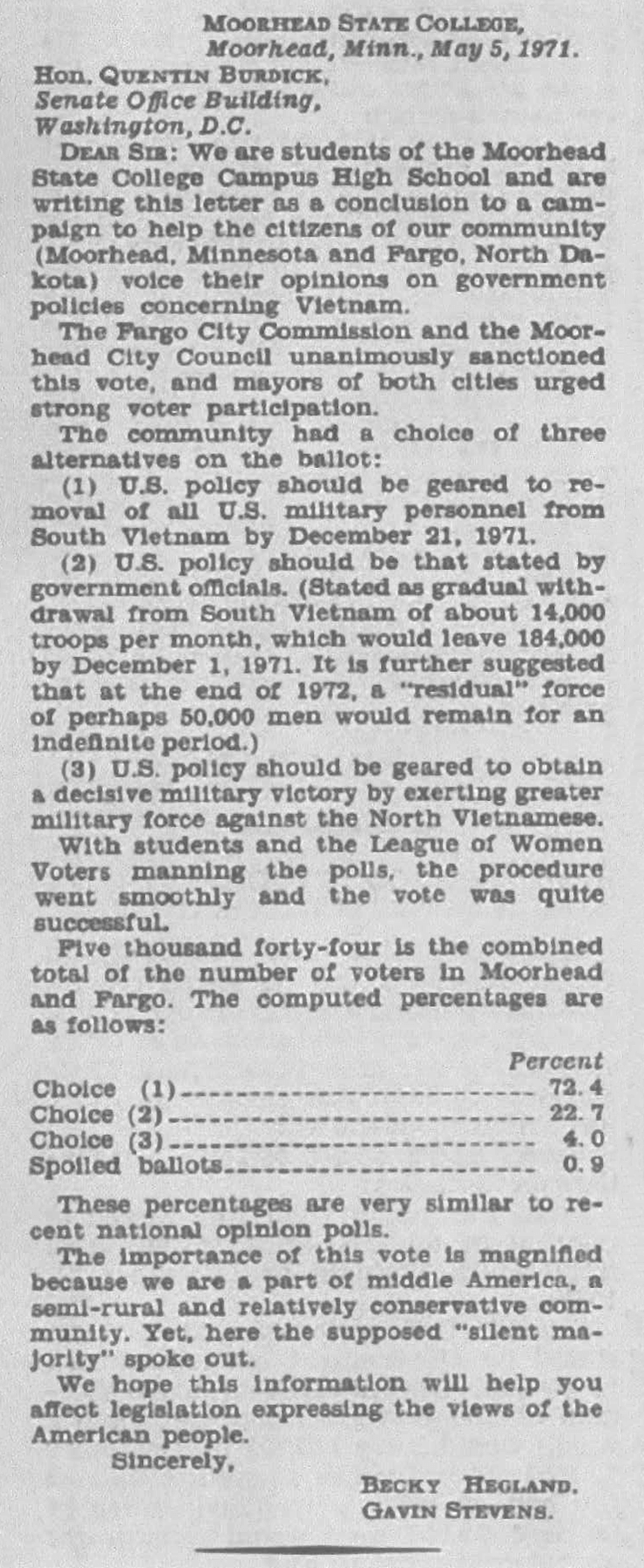
One might wonder just how much impact such a citizens’ vote of this sort might have on political decisions in Washington. That will never be known; a cacophony of voices were expressing themselves at the time. However, Representative Bob Bergland, (who later became Secretary of Agriculture) wrote a letter-to-the editor, published on May 30,1971, in the Fargo Forum, which perhaps said it best.
Quote:
“May 4 saw two kinds of protests against the war in Vietnam. In Washington, there was an attempt the bring the Federal government to a halt. It could not have succeeded and failed to advance the cause of peace. In Fargo-Moorhead, voters used the democratic process and were much more effective. This ballot-box protest will have much more impact on Congress and the President and will be a positive force in ending the war.
I would like to compliment the city councils, school boards and the League of Women voters for their part in making the election possible. Most of the credit, however, must be given to the students at the Moorhead State College Campus School for initiating the election and showing their concern through peaceful political action.
Signed: Representative Bergland, Washington"
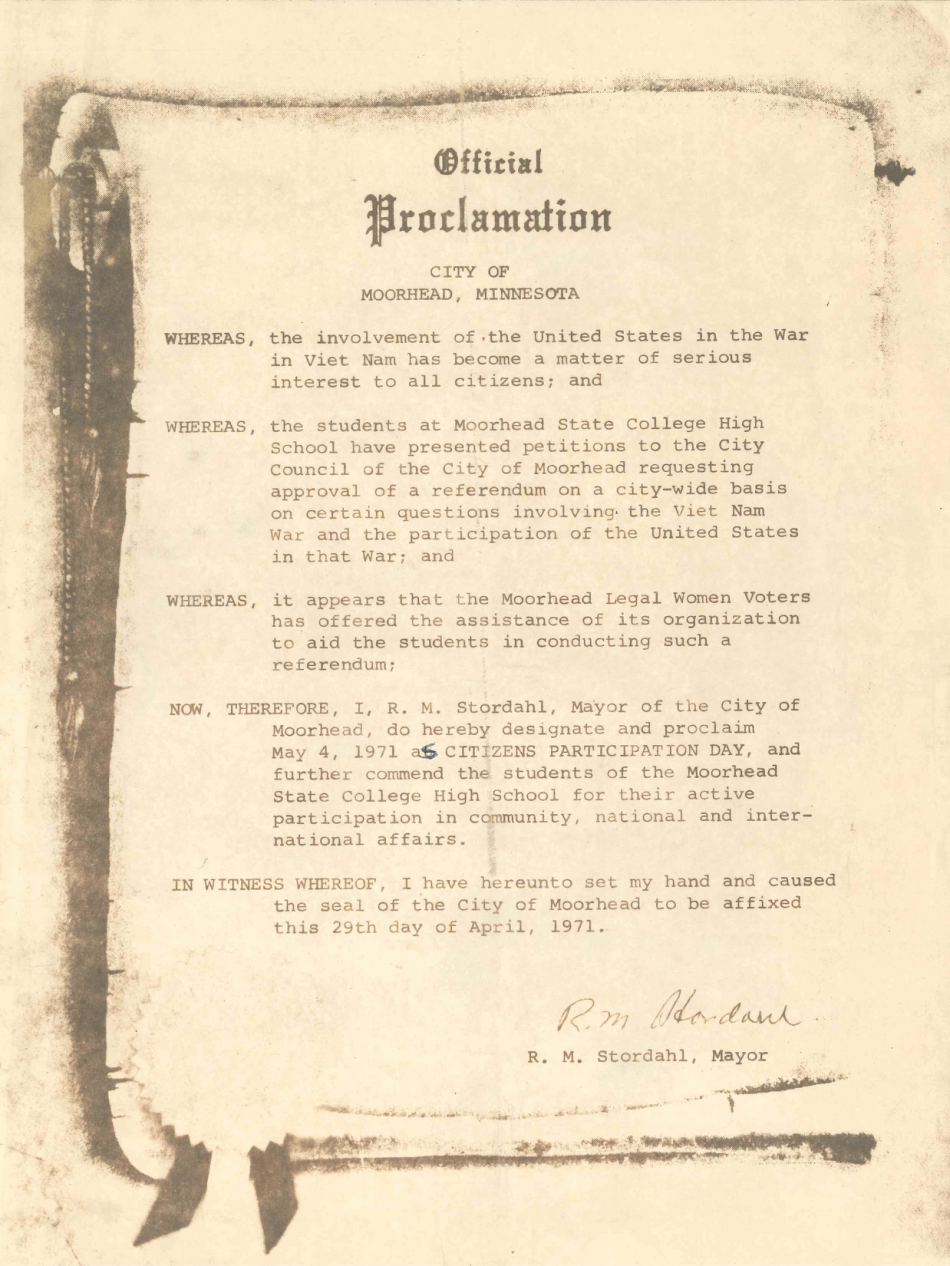
Submitted by Gerald B. Jacobs, social studies teacher, Moorhead State College high school, 1965-71
Story Themes: 1971, Civics, Civilian, Dissent, Gerald Jacobs, Jerry Jacobs, Moorhead, Moorhead State College High School, News Coverage, Politics, Read, Student Protest, Students